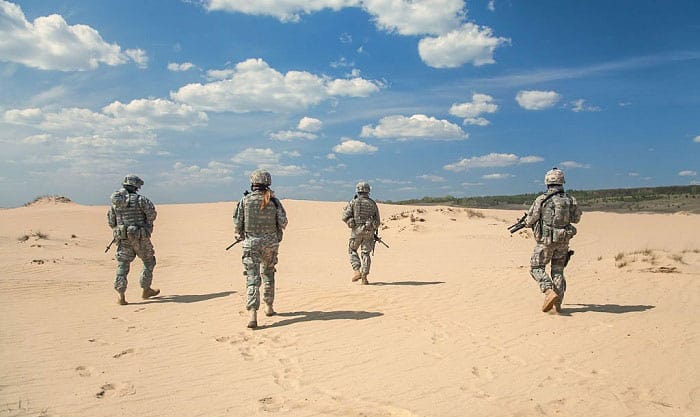There are so many jargons in the military that it is hard to keep count. Have you ever heard of the terms AWOL and UA? They are both abbreviations that are used in the discussions of absences. AWOL is short for Absence Without Leave and UA is for Unauthorized Absence.
This article will provide you with all the information about the AWOL and UA military meanings. So, continue reading to be enlightened!
Table of Contents
AWOL & UA in the Military Context
As mentioned earlier, AWOL meaning in the military is Absence Without Leave, while UA means in the military: Unauthorized Absence. They are both technical terms used to refer to a service member leaving the military without preceding authorization.
AWOL & UA vs. Desertion
AWOL and UA are often mistaken for desertion. But desertion, by definition, is when a member abandons a military post or duty without permission and the intention of returning. AWOL and UA are not desertions because they are only temporary forms of absences. Hence, AWOL and UA are similar to desertion but are not interchangeable.
UA is mostly understood as the umbrella term for absences without authorization. In the UCMJ — Uniform Code of Military Justice, there are three articles of unauthorized absence, which are:
- Article 85 – Desertion
- Article 86 – AWOL
- Article 87 – Missing Movement
Let’s dive into the details of each of these articles!
Article 85 – Desertion
Desertion is when a member of the Armed Forces:
- is not present at his/her unit, organization, or place of duty at the time given
- with the intent of being away permanently
- quits a unit, organization, or place of duty to avoid hazardous tasks or important services
- ie., combat deployment, duty in a combat zone, ship deployments, etc
- enlists in another Armed Force without regularly separating from an Armed Force
- enlists in a foreign armed service without authorization from the U.S
Punishment
As you can see, it is a lot more serious than AWOL and missing movement cases.
During war, the maximum desertion charge is the death penalty. The last U.S member executed for desertion was Private Eddie Slovik in 1945 (Civil War Era).
Desertion is not only an offense in the U.S Armed Forces. It is also prosecuted in other Forces, such as the UK, Columbia, and the Soviet Union.
- 1812 War
The desertion rate during this war was 12.7%. Many men deserted a unit for another in order to get enlistment bonuses.
- Mexican–American War
The desertion rate during this war was 8.3%. Some deserted for enlistment bonuses, while many did so to avoid the terrible conditions of the camps. Many also enlisted and deserted just to get the free transportation perk and arrive in California for the California Gold Rush.
- American Civil War
200,000 men deserted from the Union’s army of 2.5 million, and 103,400 deserted the Confederate’s less than a million men army.
- World War I
5,584 service members were charged for desertion and 2,657 were convicted for desertion. Even though they were not executed, they were publicly humiliated.
- World War II
More than 20,000 soldiers were charged for desertion, of which 49 were sentenced to death. But all 48 death sentences were commuted afterward.
- Vietnam War
Some 50,000 military members deserted during this war.
- Iraq War
- In 2002, the Army, Air Force, and Navy reported 7,978 desertions.
- While the Marine Corps reported 1,603 desertions.
- Between 2003 and 2004, over 5,500 military members deserted.
- In 2006, this number increased to 8,000.
Article 86 – AWOL
AWOL Definition Army (Or any branches for that matter…)
AWOL is when a member of the Armed Forces:
- is not at his/her designated place of duty at the time given
- leaves his/her designated place, or
- is not present at his/her unit, organization, or place of duty at the time given
Without permission, and shall be disciplined. Punishment is determined and directed by a local command level and up to the chain of command.
This should not come as a surprise since every member enlisting in the military owes a particular period of service time and is expected to honor that.
In exchange for the military’s income, pension, housing, food, and health benefits, military men must do their part in serving and abiding by the military’s code.
The conditions below must exist for a successful AWOL military prosection:
- An authority designated a time and place of duty for the accused service member
- The accused service member knew about his or he designated time and place of duty
- The accused service member did not go to his or her designations without permission
An AWOL soldier’s case can be more severe depending on how long the absence prevails. Thus, different factors are considered, such as:
- Unauthorized absence for more than 3 days vs. 30 days
- Unauthorized absence from a special duty (ie., as a watch or guard)
- Unauthorized absence from a special duty with intent to abandon it
- Unauthorized absence to avoid field exercises, drills, or maneuvers
AWOL prosecution is mostly centered on one factor: intent. Did the service member intend to be absent and did he or she intend to return?
If a member intends to return to the military when abandoning a duty or post, he or she is guilty of AWOL and not desertion.
Punishment
Going AWOL for over 30 days can earn you an issued arrest, which may lead to a federal arrest and conviction. In the worst case, you could be imprisoned. This would surely jeopardize your record, which, in turn, dulls your future employment and career prospects.
If this happens, you will be maintained in a local prison before a military one until your military court date. More often than not, you will be pursued aggressively by military prosecutors for compromising the reputation of the Armed Forces and the safety of other service personnel.
Less severe punishments can range from 1 month confinement plus 2/3 pay forfeiture to 18 months confinement plus forfeiture of all pay and a dishonorable discharge.
Defenses
There are two possible defenses for going AWOL.
- The accused did NOT know about his or her designated place of duty and time.
- The accused is dealing with difficulty and so cannot return to his or her designations.
- For example lack of transportation or sickness.
However, there must be sufficient evidence of this.
Relevant Codes & Offenses
Within this code is another status: failure to repair. It is when a formation is missing or failing to turn up at a designated place at the time ordered. It is not as serious but is nonetheless an offense.
In 2020, another duty status was set: AUN, which stands for absent-unknown. This delegates action and investigations to find a missing soldier during the first 48 hours.
Article 87 – Missing Movement
Missing movement is when a member of the Armed Forces misses the movement of a unit, ship, or aircraft at a given date and time despite knowing about their designation of that movement.
It does not matter if the member missed the movement because of neglect or by design, if the member fails to show up, they can be punished with a court-martial charge. The only exception is if the member missed the movement because of a physical inability. In that case, the member would have a viable defense. However, the caveat is that physical inability cannot be a result of neglect or misconduct.
Missing movement cases would be handled by the local command. Furthermore, they are frequently charged along with AWOL or desertion.
Relevant Codes & Offenses
Another related offense is jumping from a vessel into the water. This is exactly what it sounds like: a member flees a military vessel by throwing themselves overboard. You can be punished with a court-martial charge if you do this intentionally and wrongfully.
Conclusion
And, there you have it! As you have read in this AWOL and UA military meaning article, AWOL stands for Absence Without Leave and UA is for Unauthorized Absence. They are both used to refer to military members who do not show up for duty or the post when they are supposed to.
There are a few different associating duty statuses and offenses, such as desertion, missing movement, failure to repair, and absent-unknown. These are all worth knowing; so, hopefully, you have found the information in this article helpful. Let us know what you thought in the comments below. Leave any questions as well. Please help us share this with other readers!

I am Everett Bledsoe, taking on the responsibility of content producer for The Soldiers Project. My purpose in this project is to give honest reviews on the gear utilized and tested over time. Of course, you cannot go wrong when checking out our package of information and guide, too, as they come from reliable sources and years of experience.



